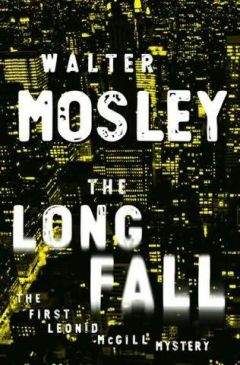Walter Mosley - The Last Days of Ptolemy Grey

Скачивание начинается... Если скачивание не началось автоматически, пожалуйста нажмите на эту ссылку.
Жалоба
Напишите нам, и мы в срочном порядке примем меры.
Описание книги "The Last Days of Ptolemy Grey"
Описание и краткое содержание "The Last Days of Ptolemy Grey" читать бесплатно онлайн.
A treasure, he thought. Glee set off in his chest, like the sunlight through the window ignited the jewel in his hand; he felt delight at the reward that Shirley double-u ara eye en gee delivered to him even though they were strangers. He experienced a deep satisfaction in the pleasure of her trust in him. He thought about Letta carrying him in through the window and tolerating his presence while she dressed and put on the red lipstick that her boyfriends paid for so dearly.
The excitement became a pain in his chest. Ptolemy, now gazing into the cloudy-eyed woman’s brown face, understood that these feelings were strong enough to kill.
He smiled broadly then and said, “Girl, you a beam’a sunshine at the end of a long day of rain.”
He put the ring in his pocket. Shirley stared at him, smiling hopefully.
Hilly came up to them then.
“Okay, Papa Grey,” he said. “Let’s go.”
“Gimme my money,” Ptolemy said.
“Later . . . at the sto’.”
“Now,” the old man commanded, “right here in this room.”
Hilly handed his great-uncle a paper envelope filled with bills in small denominations.
“This is Shirley Wring,” Ptolemy said. “Double-u ara eye en gee.”
He was no longer looking around the room, wondering at the changing faces. Ptolemy spread the envelope open and took out a ten-dollar bill. He gave the money to the woman and then took the emerald ring from his pocket.
“Will you take this gift from me, Shirley double-u ara eye en gee?”
Hilly moved his big, heavy head back and forth with a perplexed twist to his face. Shirley smiled. Ptolemy lifted the ring higher.
“You’re a sweet man, Li’l Pea,” she said, taking her collateral and squeezing it between gnarled fingers.
She put the emerald in its tissue and placed the pink paper in her velvet bag. Then she put the black velvet sack into the faded red-leather purse. Shirley Wring made a movement that was the start of a curtsy and then shuffled off to get on line to pay her phone bill.
“She a friend’a yours?” Hilly asked.
“That’s a woman there, boy,” Ptolemy replied, thinking about Coydog talking to him when he was young and didn’t know a thing.
“Wanna go to the store now?” Hilly suggested, putting his hand on his uncle’s shoulder.
“What’s your hurry?” Ptolemy asked.
“Nuthin’. We just gotta go.”
They went to Big City Food Mart and filled a plastic basket with bologna, store brand Oat Ohs, margarine, sour pickles, a bag of mini peanut butter cups, peanut butter, rye bread, orange juice, Big City brand instant coffee and creamer, and six ripe red apples. The total at the cashier came to $32.37. When they got out of line Ptolemy counted the money he had left: $169.04. He counted it three times and was starting on the fourth when Hilly said, “Come on, Papa Grey, we gotta take these things home.”
“Somethin’s wrong with my change, Reggie, I, I mean, Hilly.”
“Nuthin’s wrong,” the boy said to Ptolemy’s shoes. “That’s a lotta money you got there.”
They brought the groceries home to the apartment crowded with everything Ptolemy and his wives and his family and theirs had acquired over more than just one lifetime. Hilly put the food onto shelves and into the ancient refrigerator while Ptolemy counted his change again and again, wondering if somehow Shirley Wring had tricked him.
He thought about his trunk and Sensia, the emerald ring and Reggie—where was Reggie?
“Your money’s fine, Uncle,” Hilly said. “Now we got to get to Mama’s house.”
“Where?”
“Mama need you to come see her,” Hilly said, his brutal face ill-fitting the request.
“What for?”
“She di’n’t say. She just said to tell Papa Grey that Niecie need him to come.”
“Niecie?” All the floating detritus in the old man’s mind sank to the bottom then. The ring and Shirley Wring, the money and Melinda Hogarth, even the fire that killed Maude and the stroke that took Sensia disappeared from his mind.
Niecie. He was only thirty-six when Niecie was born but she was still the daughter of his niece. That’s why he called her Niecie, though her mother had named her Hilda. He was her granduncle and her godfather and she was the coppery color of a year-old Indian head penny. Her mother was sitting in the big chair with Niecie on her lap and Charles, June’s husband, was standing behind her. He stood just like that, like he was posing for a photograph. But that’s the way Charles was: pretty as a picture, and stuffy as a double-starched shirt collar.
“My Niecie?” Ptolemy asked.
“My mama,” Hilly said, nodding.
“Is she in trouble?”
“She need to see you,” the boy said as he put the nonperishable food in the doorless cabinet. “You got cans on these shelves older than me.”
“What fo’?”
“Why you got them cans?”
“Why Niecie wanna see me?”
“She di’n’t say, Papa Grey,” Hilly whined. “She jes’ told me to help you shop and then to bring you ovah. She said to tell you that your Niecie needed to see you.”
“Niecie.”
The number 87b bus moved slowly in afternoon traffic. Ptolemy sat on a turquoise-colored plastic seat facing across the small aisle, while Hilly hovered above him, holding on to the shiny chrome pole.
A middle-aged Chinese woman and a dark Spanish man sat across the way. Both of them smiled at Ptolemy. People were always smiling at him now that he was so old. Even people who looked old to him smiled because, he knew, he looked even older to them.
He could feel the city move by at his back, could imagine the old Timor Cinema and Thrifty’s Drugstore. He thought about jitterbuggers in the juke joints and a small white wooden church that stood on the white side of town.
Sometimes when he’d go by there, on an errand for his mother or a mission for Coydog, he’d stop and gape at the beautiful building with the stained-glass windows of Jesus, John the Baptist, Job, Jonah, and Mary Magdalene. Magdalene was a beautiful name.
One day when he was no more than seven he was standing out in front of that church with a note in his hand. He couldn’t remember on the number 87b bus who that note was for or from but he could feel the dirt under his bare feet and the hot sun on his forehead.
“What you want there, boy?” a man asked in a commanding voice.
Ptolemy was gazing down on the dark Spanish man’s brown leather shoes in the bus but when he looked up he saw that white man standing in front of the white people’s church.
“Lookin’,” he said in a small piping voice.
“Is that note for me?” the man asked.
Li’l Pea thought the word no, but all he did was shake his head.
The white man wore a white suit with a black shirt that sported a small square of stiff white cloth where his Adam’s apple would have shown. He wore a wide-brimmed Panama straw hat and glasses with gold wire frames.
“Speak up, boy,” he said.
“No, suh. This note is from my uncle Coy to his brother Lupo work for the Littletons down on Poinsettia Street,” Ptolemy said, remembering as he did the origins of the note.
“Then why you standin’ in front’a my church?”
The sun was above and behind the church spire so whenever the man in the preacher’s uniform moved his head, bright sabers of light lanced into Ptolemy’s eyes.
“It’s so pretty,” the man, Ptolemy, remembered saying.
The minister paused a moment, his stern visage softened a bit.
“You like this church?” he asked.
“Yes, suh.”
“Did you evah look inside?”
“No, suh. I jes’ seen the whitewashed walls an’ the windahs and the pretty grass lawn.”
The minister squinted as people did sometimes when they were trying to make out words that didn’t make sense to them. Li’l Pea often wondered how narrowing your eyes could make your hearing better.
“You know that you can never, or none of your people can ever, go into this church,” the man said.
“Yes, suh, I know.”
“Is that why you lookin’ at it so hard?”
“No. It’s jes’ when I walk by it, it look so pretty like Letta across the way from Uncle Coy’s windah. You have to look when somethin’s pretty.”
The white man turned his back on the boy and looked at his church. He maintained that position for a few moments, allowing Li’l Pea to admire the building a while longer.
When the white man turned around, his face was completely changed, as if he were a different man inside. He held out a hand to the boy. The child didn’t know what to do, but he was drawn to the gesture. He grabbed the minister’s manicured fingers with his dirty hand and gave them a good shaking.
“Thank you, boy,” the minister said. “You’ve shown me my own life in a new light. It’s like, it’s like I thought it was day but really there was much more to be seen.”
The white man walked away after that.
Ptolemy had often wondered, in the eighty-four years that had passed since that day, what the minister had meant.
“Come on, Papa Grey,” Hilly said in a bus a million miles away, “this our stop.”
They walked down a long street of sad houses and apartment buildings. There were few lawns or gardens, mostly weeds and broken concrete. Some of the houses had no paint left on their weathered wood walls; one or two seemed crooked because they were falling in on themselves from the ravages of termites, faltering foundations, and general rot.
Ptolemy thought all these things but he couldn’t remember how to say them.
“Terrible.”
“What, Papa Grey?”
“Terrible.”
“What? You hurt?”
“My knees hurt when I walk.”
“That’s too bad.”
“But it’s not terrible,” Ptolemy said.
“Then what?”
The old man glanced across the street and saw a big sand-brown woman sitting on a stoop. She was smoking a cigarette and between her fat knees were huddled two toddlers in diapers and nothing else.
“Her.”
Two blocks away they came to a small house that was once painted bright blue and yellow, Ptolemy remembered, but now the colors were dim and dingy. There were cars parked in the driveway and at the curb at the house across the street. Men and women in their Sunday best were standing on the brown grass and up beyond the cars.
“What’s today?” Ptolemy asked Hilly.
“The fifteenth,” the young man replied.
Four rose bushes had died under the front window. A fifth rose was still alive. It had nine or eleven bright green thorny leaves and a bud that might one day blossom. Ptolemy noticed a spigot behind the struggling plant and realized that it was a leak that made it possible for that rose to survive.
Hilly held Ptolemy’s elbow as they went up the wooden stairs that had worn down into grooves from the heavy foot traffic over the years. As they approached the screen door, Ptolemy could see that there was a party going on. Dozens of people were crowded into the living room, talking and smoking, drinking and posing in their nice clothes.
Hilly reached for the screen door but it flew inward before he touched it.
“Pitypapa!” a woman yelled. “Pitypapa, I ain’t seen you in six and a half years.”
Big, copper-brown, and buxom Hilda “Niecie” Brown folded the frail old man in a powerful yet cushioned embrace. For a brief span that extended into itself Ptolemy was lifted out of his pained elderly confusion. He floated off into the sensation of a woman holding him and humming with satisfaction.
She kissed his forehead and then his lips. When she let him go he held on to her arm.
“Oh, ain’t that sweet?” Niecie said. “You miss me, Pitypapa?”
Ptolemy looked up at her face. Her skin was smooth and tight from fat. Her mouth was smiling, showing two golden teeth, but in spite of the brave front Niecie’s eyes were so sad that he felt her agony. He raised his hands through the pain of his shoulders and placed them on the sides of Niecie’s arms.
“Niecie,” he said. “Niecie.”
“Come on in, Pitypapa. Come on in and sit with me.”
The crowded room smelled of food, cigarettes, and booze. Four children were playing on a green couch but Niecie shooed them away.
“Sit with me, Papa,” she said. “Tell me how you been doin’.”
Ptolemy sat looking around the room, remembering the house. He had come here for Niecie’s wedding and later, when her mother, June, had died. June was his oldest sister’s child, he remembered. She died of pneumonia, the doctor said, but anyone could have told you that she really died because she went wild with drink and dance after Charles had died.
“You remember my house?” Niecie asked.
“I only remembah it bein’ old,” he said. “I was already old when you got married. There ain’t nuthin’ here young or childish.”
Even Niecie’s smile was sad now.
A short girl came up to stand next to Niecie. She was dark-skinned; not as dark as Ptolemy but almost.
“You remember Robyn?” Niecie asked. “But maybe not. Maybe she came here to live wit’ me since the last time I seen you. Her mother died an’ me an’ Hilly took her in.”
Robyn was no more than eighteen and she was beautiful to Ptolemy. Her almond-shaped eyes looked right into his, not making him feel old or like he wasn’t there. And there was something else about her: she didn’t remind him of anyone he had ever met before. Usually, almost always, people looked to him like someone he’d already met along the way. That was why he found it so hard to remember who someone was. Faces usually made him want to remember something that was lost. He felt sometimes that he had met everyone, tasted every food, seen every sky there was to be seen.
“I seen it all,” old Coydog used to say, “but that don’t mean I seen everything.”
Ptolemy understood now because Robyn was someone, something, new to him.
“Hi,” she said with perfect lips that smiled briefly, showing off her strong white teeth.
“You grinnin’, Pitypapa,” Niecie said. “All the men here be grinnin’ after Robyn.”
“I have never seen anything like you, girl,” Ptolemy said.
Robyn put out a hand and he took it, staring at her.
He was suddenly aware that somewhere a woman was crying. The faraway, muted sobs were pitiful. For some reason this made Ptolemy remember.
“Where’s Reggie?” he asked Robyn.
With her eyes she indicated someplace behind Ptolemy. He tried to turn his head but his old joints wouldn’t cooperate.
“Why don’t you go with him, Robyn?” Niecie said.
Ptolemy was still holding her hand. She pulled gently and he got up with a minimum of pain in his knees. Robyn was just about his height. He grabbed on to her elbow and she guided him through the mob of guests in the living room. They went into a narrow hallway that made the house seem larger because it was so long.
They passed a room from which came the sad sobbing. He removed his grip from Robyn’s arm. Gently she took the hand in hers.
Подписывайтесь на наши страницы в социальных сетях.
Будьте в курсе последних книжных новинок, комментируйте, обсуждайте. Мы ждём Вас!
Похожие книги на "The Last Days of Ptolemy Grey"
Книги похожие на "The Last Days of Ptolemy Grey" читать онлайн или скачать бесплатно полные версии.
Мы рекомендуем Вам зарегистрироваться либо войти на сайт под своим именем.
Отзывы о "Walter Mosley - The Last Days of Ptolemy Grey"
Отзывы читателей о книге "The Last Days of Ptolemy Grey", комментарии и мнения людей о произведении.









